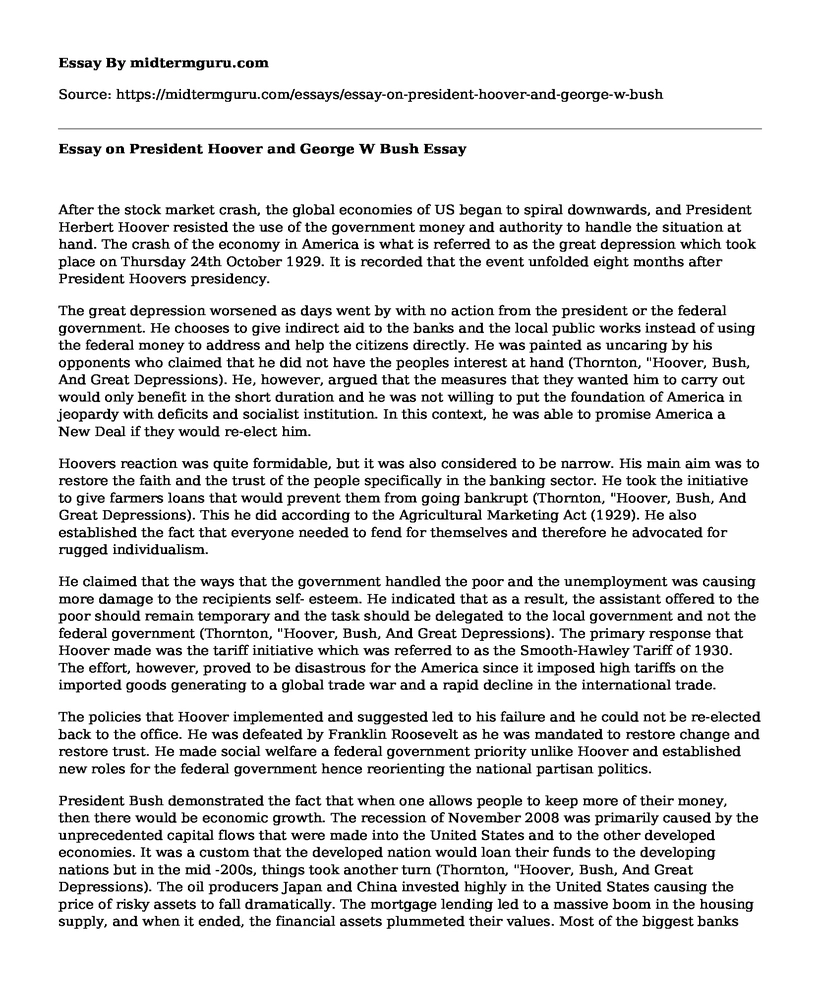After the stock market crash, the global economies of US began to spiral downwards, and President Herbert Hoover resisted the use of the government money and authority to handle the situation at hand. The crash of the economy in America is what is referred to as the great depression which took place on Thursday 24th October 1929. It is recorded that the event unfolded eight months after President Hoovers presidency.
The great depression worsened as days went by with no action from the president or the federal government. He chooses to give indirect aid to the banks and the local public works instead of using the federal money to address and help the citizens directly. He was painted as uncaring by his opponents who claimed that he did not have the peoples interest at hand (Thornton, "Hoover, Bush, And Great Depressions). He, however, argued that the measures that they wanted him to carry out would only benefit in the short duration and he was not willing to put the foundation of America in jeopardy with deficits and socialist institution. In this context, he was able to promise America a New Deal if they would re-elect him.
Hoovers reaction was quite formidable, but it was also considered to be narrow. His main aim was to restore the faith and the trust of the people specifically in the banking sector. He took the initiative to give farmers loans that would prevent them from going bankrupt (Thornton, "Hoover, Bush, And Great Depressions). This he did according to the Agricultural Marketing Act (1929). He also established the fact that everyone needed to fend for themselves and therefore he advocated for rugged individualism.
He claimed that the ways that the government handled the poor and the unemployment was causing more damage to the recipients self- esteem. He indicated that as a result, the assistant offered to the poor should remain temporary and the task should be delegated to the local government and not the federal government (Thornton, "Hoover, Bush, And Great Depressions). The primary response that Hoover made was the tariff initiative which was referred to as the Smooth-Hawley Tariff of 1930. The effort, however, proved to be disastrous for the America since it imposed high tariffs on the imported goods generating to a global trade war and a rapid decline in the international trade.
The policies that Hoover implemented and suggested led to his failure and he could not be re-elected back to the office. He was defeated by Franklin Roosevelt as he was mandated to restore change and restore trust. He made social welfare a federal government priority unlike Hoover and established new roles for the federal government hence reorienting the national partisan politics.
President Bush demonstrated the fact that when one allows people to keep more of their money, then there would be economic growth. The recession of November 2008 was primarily caused by the unprecedented capital flows that were made into the United States and to the other developed economies. It was a custom that the developed nation would loan their funds to the developing nations but in the mid -200s, things took another turn (Thornton, "Hoover, Bush, And Great Depressions). The oil producers Japan and China invested highly in the United States causing the price of risky assets to fall dramatically. The mortgage lending led to a massive boom in the housing supply, and when it ended, the financial assets plummeted their values. Most of the biggest banks had invested in those assets, and they began to fail as a result.
Most people wanted President Bush to write a $700 billion check to bail out the failing largest banks, but the president did not want to go on with it. In September 2008, there was a period of global panic, but instead, the president reduced the tax relief and provided a cut of $1.7 trillion relief. He worked with the Congress to reduce the tax burden on the American families and the small business men to enable them to save and invest. The unprecedented economic growth was ended by the turbulent of credit markets and housings. He led a bipartisan passage of economic growth that boosted the consumers spending and at the same time encouraged business to expand. Bush provided a rescue plan by allowing the small businessmen to save and invest since he knew that economy would grow if they saved their money.
Work cited
Thornton, Mark. "Hoover, Bush, And Great Depressions." Mises Institute. N.p., 2011. Web. 16 May 2017.
Cite this page
Essay on President Hoover and George W Bush. (2021, Jul 01). Retrieved from https://midtermguru.com/essays/essay-on-president-hoover-and-george-w-bush
If you are the original author of this essay and no longer wish to have it published on the midtermguru.com website, please click below to request its removal:
- Does Peacekeeping Keep the Peace? Article Review Paper Example
- Paper Example on State's Rights: the Role of the Federal Government and the Constitution
- Essay Sample on America's Movements and Its Music
- The Heroes of Greek Mythology: Oedipus, Heracles, Chilles, and Jason - Essay Sample
- Bay of Pigs Invasion - Research Paper
- Slavery: A Dark History, Unpunished and Romanticized - Essay Sample
- Are Dinosaurs Real? A Definition and Explanation - Essay Sample







